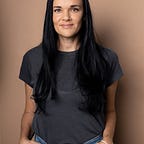Economy of the Unwelcome
It’s been a minute. I went to Thailand! I visited with refugee friends who are close to being resettled after I met them in Bangkok six years ago, thank God. I had coffee with friends and colleagues and there was sun and temples and 7–11s and lingering dinners and lanterns in the sky. Heaven. Honestly, I’ve been trying to get on track since returning, and it’s taken me longer than I care to admit. Still not sure where that track went or how to get back to it.
The last few weeks of coverage from Ukraine has been horrifying. We are seeing a country dismantled (but not defeated) in real time. Some early media coverage of the exodus was, uh, less than desirable. Some of it was outright racist. Trevor Noah pointed out that Europe was seemingly full (and in riot gear!) when Syrians tried to enter Europe while fleeing conflict. He also stated, obviously but pointedly, that “refugee is not a synonym for brown people.” Not only has the term refugee been racialized, but it’s been used to stoke fear and divide. People are afraid when you ask them about refugees, as if they don’t know the definition or they don’t know that refugees are everywhere. None of this shit media coverage surprises me after years working with refugees and displaced people. There is always the “Why don’t you help people from this country?” question. Or “Is it possible they aren’t really in danger?” For some reason, when you help refugees, the question is always, are they the right kind of person?
What did surprise me was the response to Ukrainian refugees in Poland and Romania. Ukrainians were universally welcomed. Polish women left strollers at train stations for mothers traveling with children. Tulips were passed out to Ukranian women in Romania on International Women’s Day this week. The thing that really got me was Germans holding up placards at train stations — 1 mother 1 child for 2 weeks. I have a room for 2 people available until further notice. THIS is the holy work of welcome — creating an economy of the unwelcome. Making them feel wanted. Inviting people into safety. Bidding to be able to help a stranger. Come here! Take my room! You are welcome. This is a world that is possible if we choose it to be.
I’m not naive to the politics of borders and security. I know, I know we can’t just let everyone in. There are also things unique to this crisis — Ukrainian refugees are primarily women and children. Many countries in the region have memories of Soviet aggression and do fear their own safety as part of this conflict. But the humanity on display, the unqualified love and welcome for Ukrainian refugees, broke my heart a little, with its beauty and also with its stark contrast to other situations. This is possible? It can look like this? And, alternatively, wait, why don’t we do this? Why does our border look like this? I haven’t heard one report of a German or Polish person asking of Ukrainian refugees — But what if they take our jobs? We distance ourselves from people when we want to. We have the ability to see people as like us, to welcome them and find them worthy, or we can choose not to. I want to choose to hold up a sign at a train station, to be just one of hundreds vying to help someone and offer safety. And, when I am in need, when I inevitably require welcome, I want to belong. I want to matter. Ukrainians matter. Yemenis matter. Burmese matter. Ethiopians matter. Congolese matter. We can remind ourselves and them of that. With tulips.
